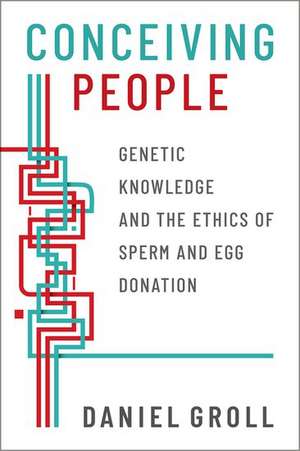Conceiving People: Genetic Knowledge and the Ethics of Sperm and Egg Donation
Autor Daniel Grollen Limba Engleză Hardback – 30 noi 2021
Preț: 493.87 lei
Preț vechi: 519.86 lei
-5% Nou
Puncte Express: 741
Preț estimativ în valută:
94.50€ • 98.67$ • 78.04£
94.50€ • 98.67$ • 78.04£
Carte disponibilă
Livrare economică 25 martie-08 aprilie
Livrare express 08-14 martie pentru 35.38 lei
Preluare comenzi: 021 569.72.76
Specificații
ISBN-13: 9780190063054
ISBN-10: 019006305X
Pagini: 254
Dimensiuni: 241 x 165 x 25 mm
Greutate: 0.52 kg
Editura: Oxford University Press
Colecția OUP USA
Locul publicării:New York, United States
ISBN-10: 019006305X
Pagini: 254
Dimensiuni: 241 x 165 x 25 mm
Greutate: 0.52 kg
Editura: Oxford University Press
Colecția OUP USA
Locul publicării:New York, United States
Recenzii
While a claim about access to genetic knowledge lies at the heart of Groll's book, he is all too aware of the social forces that influence people to care about their genetic origins...Conceiving People is aimed principally at the decisions of individual actors-those intending to become parents with donated gametes and those donating their gametes for this use.
The analysis is effective, featuring precise definitions and framing of key ideas while providing enough explanation of concepts to support readers only somewhat familiar with gamete donation as a route to conception ... To foster a philosophical conversation on the larger topic of donor gamete conception, this would be a useful resource to include in a bioethics, medical ethics, or similar course.
Conceiving People is a smart and engagingly written book that argues that people who intend to conceive with donated gametes ought to use an "open donor." I expect this important book will have an impact on the philosophical debates about gamete donation, on individual parenting choices, and on public policy (even though the latter isn't Groll's primary target). Groll's main argument is that the obligation to use a known donor follows from the likelihood that the child of the prospective parents will come to have a significant, worthwhile interest in acquiring genetic knowledge. But the book also touches on lots of other interesting themes in family ethics along the way. It's not just a march to the conclusion and Groll also takes a subtle and gentle approach to the arguments he examines.
This is a deeply insightful and engaging treatment of the moral right to know one's origins. Daniel Groll is a fluid and witty writer. He brings clarity and astute analysis to a neglected area of ethics.
Daniel Groll gives the best argument I've seen in favour of openness with gamete donation. Absent are the usual problematic statements about genetic knowledge being required for identity formation or self-knowledge. And present is an acute awareness of the social forces that can profoundly shape people's interest in knowing their genetic origins. The chapters mainly stand alone, but Groll says, "go on, read the whole thing!" I say that's well worth doing.
Groll's book has much going for it and makes extremely important contributions to the debate over anonymous donor conception. Readers interested in any of the above topics or simply looking for engaging, well-written, and impressively accessible philosophy would do well to read it.
The analysis is effective, featuring precise definitions and framing of key ideas while providing enough explanation of concepts to support readers only somewhat familiar with gamete donation as a route to conception ... To foster a philosophical conversation on the larger topic of donor gamete conception, this would be a useful resource to include in a bioethics, medical ethics, or similar course.
Conceiving People is a smart and engagingly written book that argues that people who intend to conceive with donated gametes ought to use an "open donor." I expect this important book will have an impact on the philosophical debates about gamete donation, on individual parenting choices, and on public policy (even though the latter isn't Groll's primary target). Groll's main argument is that the obligation to use a known donor follows from the likelihood that the child of the prospective parents will come to have a significant, worthwhile interest in acquiring genetic knowledge. But the book also touches on lots of other interesting themes in family ethics along the way. It's not just a march to the conclusion and Groll also takes a subtle and gentle approach to the arguments he examines.
This is a deeply insightful and engaging treatment of the moral right to know one's origins. Daniel Groll is a fluid and witty writer. He brings clarity and astute analysis to a neglected area of ethics.
Daniel Groll gives the best argument I've seen in favour of openness with gamete donation. Absent are the usual problematic statements about genetic knowledge being required for identity formation or self-knowledge. And present is an acute awareness of the social forces that can profoundly shape people's interest in knowing their genetic origins. The chapters mainly stand alone, but Groll says, "go on, read the whole thing!" I say that's well worth doing.
Groll's book has much going for it and makes extremely important contributions to the debate over anonymous donor conception. Readers interested in any of the above topics or simply looking for engaging, well-written, and impressively accessible philosophy would do well to read it.
Notă biografică
Daniel Groll is an Associate Professor of Philosophy at Carleton College in Northfield, MN and an Affiliate Faculty Member at the Center for Bioethics at the University of Minnesota.
